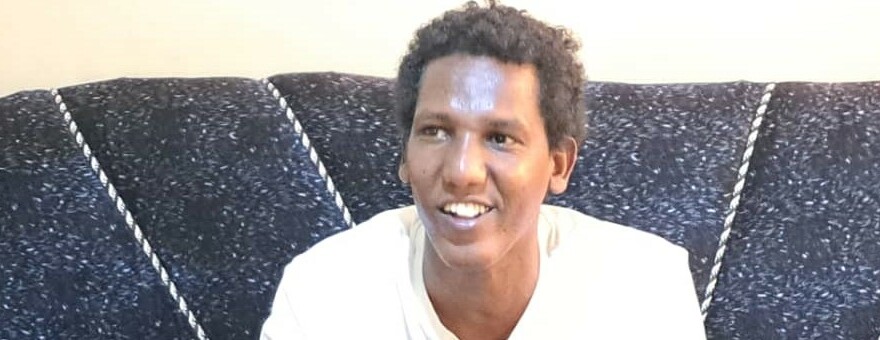I am Mohammed Abdel-Karim, known by the nickname Newton. I am enrolled at the University of Khartoum and a resident of the Jabra area before the war.
Newton’s journey of loss and hope
The outbreak of the April 15 War found me in Khartoum, specifically in Bahri town. On that fateful morning, I, along with others, gathered at the graveyard for a burial. My plan was to return to Khartoum town before noon, so I took a brief nap until the designated time.
An hour later, within the confines of my uncle’s home in the Shambat neighbourhood, the reverie was shattered by the jarring sounds of war. Helpless, we waited and followed the unfolding events on TV, as we were unable to witness any movements or clashes on the ground nearby.
Around 11 am, my brother and I made the difficult decision to leave, forsaking the safety of my mother due to the potential risks of the war. Despite the city’s grim appearance, plunged into darkness, we navigated our way home by traversing Industrial Avenue in Bahri, Haj-Yousif Street, and then through Sharq Alneel.
Armed forces controlled the area, and we eventually headed to Soba Bridge, the only accessible route to Khartoum town. Astonishingly, upon arrival, we discovered life to be surprisingly normal, with people using transportation and markets operating.
Two days post-war, the ambiguity and gloom of the situation dawned on me. Concerned for my diabetic mother’s well-being, I advised my family to send her to our home city in Shandi. Consequently, my cousin escorted her to the bus station in Bahri. Unfortunately, I realized that meeting my family again was uncertain, and our communication would be restricted to mobile phone calls.
Though I had seen my mother once since the month of Ramadan, the most heart-wrenching moment was bidding farewell to my married sisters and brothers who shared our home during those challenging times.
During my journey from Jabra to Renk City, I found myself seething with anger at the blatant violations of integrity and dignity against women and the elderly, who were visibly frightened. Opting for river transportation from Renk, we boarded a boat provided by an organization facilitating travel from Renk to Malakal. After spending six days there, we finally took a flight to Juba.
Arriving in Juba left me with a sense of disorientation and emptiness. Despite having relatives in the city, I chose not to visit them. Instead, my friends graciously assisted me with the hotel accommodation fees. By chance, I called a relative, updating him about my presence in Juba. To my surprise, he insisted that I should pay a visit to my relatives.
During my stay in Juba, I managed to scrape together a hundred dollars, enabling me to embark on a land journey to Kampala. The trip from Juba to Kampala unfolded as a remarkable adventure, accompanied by good company.
However, the real challenges arose during the subsequent journey from Kampala to Nairobi. Short on funds and with limited proficiency in English, the road ahead seemed daunting. Yet, I pressed on.
Upon reaching Nairobi, the stark realization hit me—life here was an entirely different experience, marked by cultural, traditional, and social disparities. Always feeling like a stranger, I found myself caught in a constant state of overthinking, pondering the uncertainties of our future and the actions we ought to take.
In the midst of it all, my fervent wish remains for the well-being and health of my family, holding onto the hope of a reunion in the near future.
This text is part of a collection of personal testimonies produced by Radio Tamazuj as part of a series of survivor accounts in Sudan. If you or someone you know has a story to tell, please contact us.




